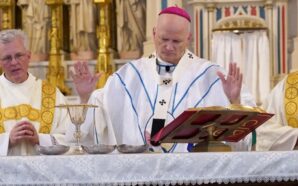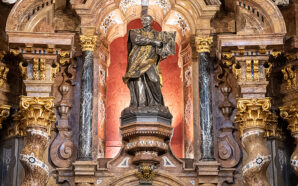This is a two-part series by Fr Joseph Lam, Parish Priest of the Parish of Baulkham Hills. Stay tuned for Part two of this series.
After a short but intense illness, Pope Francis died of heart failure in the early morning of Easter Monday, April 21, 2025, at 7:35 a.m. According to the Vatican, the Holy Father passed away “peacefully.”
The death of a Pope is always an event of great significance for Catholics. Therefore, we will mourn for nine days as prescribed. Until his burial, however, we want to honour our Holy Father and pray for him.
But how should we remember him? Perhaps you will allow me to add my personal thoughts here.
The Pope from Argentina has tried to live out his pontificate as a “pope close to people.” At first, that was simply his nature. He loved meeting people; even in the last photos of him, there were moments of a friendly smile on his face, which was already marked by illness. I have a lasting and extremely positive memory of how, at his very first general audiences after his election, Pope Francis let his gaze wander over the incredible crowds and waved a greeting to individuals who hadn’t made it to the front rows or gave them a glance and a brief nod. Even then, what would characterise his pontificate was becoming apparent: his concern for those distant from the Church. And on the last full day of his life, Easter Sunday 2025, he forced himself to show himself to the pilgrims in St. Peter’s Square and, with a shaky voice, to give his last blessing.
But this outreach to people was more than just an expression of Francis’s own nature; he wanted to do good to people, and he lived this out as his very own ministry. With God’s grace, Pope Francis refined his character into a charisma—and that is by no means a small thing. Here, as “village priest of the whole world,” Francis touched the very essence of his own calling.
Where does Francis find strength for a difficult service? I had the privilege to study the writings of Francis. Below is a summary of what Pope Francis stood for:
The main source probably lies in his deep experience of the mercy of God. Mercy, a central theme in Pope Francis’s papacy, is not merely a theological concept but a guiding principle for his leadership and a driving force behind his reform efforts. He sees mercy as a way to heal, forgive, and reconcile, and he encourages all baptised to embrace a more compassionate and understanding approach to those on the margin of the society and Church. From here the theological bridge to his conception of the Church was established. Francis calls for a more “poor” and humble Church, and his focus on social justice and human dignity are key elements of his ecclesial renewal. Pope Francis challenges traditional disciplinary approaches within the Church and emphasises the need for a more pastoral and caring relationship with its members. He wants a Church that is more welcoming, inclusive, and responsive to the needs of the people. His reform encompasses a range of initiatives, including decentralising power within the Vatican, addressing the clergy abuse crisis, and promoting a more inclusive and pastoral approach to evangelisation. He also calls for a more compassionate and merciful approach to the sacraments and pastoral care.
Externally, he strives for a friendly and trusting relationship with Christian and non-Christian religious communities. Pope Francis consistently emphasises the importance of both ecumenism and interreligious dialogue as essential for building peace and fostering understanding in the world. He sees these dialogues as a means of “building bridges” and promoting “true links of friendship” between people of different faiths.
With his passing, Francis has left us a theological and ethical legacy that represents both an opportunity and a challenge for the Church.
Pope Francis had veritable giants as predecessors, such as St. John Paul II and the brilliant theologian Pope Benedict XVI. In contrast, Pope Francis was “just like you and me.” Popes John Paul II and Benedict XVI also had their perceptible human limitations in the exercise of their office, and at the beginning of his own pontificate, Benedict, with his typical humility, said: “There cannot be only great popes,” referring to himself.
As a humble shepherd, Francis will perhaps also apply this wisdom to himself. Before the great heavenly Shepherd, all earthly shepherds are merely sinners.
Pope Francis asked people remarkably often: “Pray for me.” Perhaps we should also take this with us for future popes: The Rock of Christ sustains us as a Church—but in a remarkable reversal of the image, we as a Church also carry the Rock of Peter: through our prayers, through our thoughts and values, and not least through our actions and concrete lives. Let us all ensure that the Rock of Peter does not crumble!
May the good Lord grant his servant Francis the rest, as we will all need this in our death.
The theological-spiritual Vision of Pope Francis
Origins of his thinking and actions
Far beyond the Church, people rubbed their eyes in amazement and wondered what happened in Rome in the spring of 2013. Jorge Bergoglio, Pope Francis, has succeeded in changing the perception of the Catholic Church in a short time. There were outward corrections in style, language, and gestures, but also and above all, new themes. The list of items on the agenda for Church reform is being changed, new priorities are being set. Above all: a poor church for the poor. And everyone is invited to take steps in this direction. It is a movement forward, a pro, not a con, a reform that does not seek to criticise, exclude, or distance itself, for example, from its predecessor, but rather to bring all people of good will along with it. Where did this charisma, which is capable of appealing to so many people, grow? Where are the roots of its thinking and actions? An attempt is made here to focus on the Jesuit background from which our Pope’s spirituality has grown and matured. Hans Schaller uses a phrase that well and aptly summarises Ignatian spirituality. Pope Francis himself mentions it in the famous interview he gave to Father Spadaro SJ for Jesuit magazines. [1] He is familiar with it, not only because he is a Jesuit, but also because Hölderlin chose this phrase as the prologue to his Hyperion, and because the Pope, as is well known, is a lover of this poet. It reads: “Non coerceri a maximo, tarnen contineri a minimo hoc divinumest.” – “Not to be limited by the greatest and yet enclosed in the smallest, that is divine.”
Unlimited by the greatest
What is meant, however, is not the striving of an ambitious character who naturally makes excessive demands and, in doing so, overburdens themselves and life. It is not about arrogance, but rather a Christian virtue called magnanimity. It refers to an inner attitude of faith that trusts God and his work to achieve great things. The soul reaches out for greatness, reckoning with boundless trust in the mighty work of God. “Few people suspect what God could do with them if they entrust themselves to him unconditionally.” Ignatius of Loyola was by nature averse to everything low and half-hearted. As he searched for the meaning of his life, he allowed himself to be led ever more to that trust in which he trusted God more than himself. Greater things than he could conceive became reality in his life through his trust in God. He increasingly began to count on divine help, drawing ever closer to God. He wrote of himself: “If perfection consists in the ardent desire for it, I will not give any living person an advantage in this regard.” Pope Francis’s magnanimity is especially evident when, with regard to the reform of the Church, he did not content himself with merely external, aesthetic corrections in style, but proposed a major reform program with a definite content.
A reform at all levels, the implementation of which can only be possible with great help from God.
“I invite every Christian, regardless of place and situation, to renew today their personal encounter with Jesus, or at least to resolve to let themselves be found by Him, to seek Him every day without ceasing… There is no reason why anyone should think this invitation is not extended to them, for no one is excluded from the joy that the Lord brings us.” (EG 3)
It is perhaps part of the humour of Providence that the short speech Cardinal Bergoglio gave in the pre-conclave, in which he imagined the future Pope as a man who would help the Church to go beyond itself, to existential and social peripheries, was viewed by the cardinals as an unintentional and somehow providential self-recommendation. And what the Pope has sought to formulate in countless variations since that speech, was already formulated in essence there, in the pre-conclave.
“Evangelising in the Church presupposes the boldness to step outside of oneself (salir de si isma). The Church is called to step outside of itself and go to the peripheries, not to the geographical peripheries, but also to the existential peripheries: the periphery of the mystery of sin, of pain, of injustice, of ignorance, of religious non-compliance, of thought, of every kind of misery… If the Church does not step outside of itself to evangelise, it remains self-referential and becomes sick. The evils that develop over time in ecclesiastical institutions have their roots in self-referentiality, a kind of theological narcissism.”
Those who dare to push the boundaries risk making mistakes. This applies to individuals, but also to institutions, including those like the Church. Despite such dangers, the Pope never ceases to invoke this courage to step outside and go to the limits. Dare something for God, even at the risk of being mistaken or getting involved in great difficulties. He prefers a Church that has become dirty in the streets outside to one that clings to its security and becomes so comfortable. Here, the well-known words of Father Arrupe, whom Father Bergoglio had as Superior General, may resonate:
“We do not try to defend our mistakes, but on the other hand, we do not want to fall into the even greater error, which would consist of faintly giving up on initiatives for fear of making mistakes again.” [2]
He, who takes matters in hand quickly and decisively, is thoughtful and cautious when it comes to long-term changes.
“I distrust decisions made impulsively; I always distrust the first decision, that is, the first thing that comes to mind. It is generally wrong. I must wait, weigh things up internally, take the necessary time. The wisdom of discernment replaces life’s necessary ambiguity, and let us find the most appropriate means, which are not always identical with what seems great and powerful to us.” [3]
Whoever reaches for great things is at the same time the one for whom the smallest things are not too small to concern themselves with. It is easy to enumerate words and gestures, especially the gestures of Pope Francis, that testify to such being held in the smallest things. Starting with the moment when he, newly elected Pope, still pays a bill at his pension himself, or when he picks up the phone to arrange an appointment with a newspaper editor. These are all edifying, humane, even amusing gestures that lend a magic to the beginning of a pontificate, making it human and sympathetic. But they are also more than beautifying accessories. They are an expression of that fundamental intellectual attitude, that spirituality that, despite the magnitude of the set goals, does not forget the small things. Even the most everyday things are places of encounter with God, even for a high dignitary such as the papal office. Where this being held in the smallest things is most clearly evident, however, is in the way our Pope reaches out to small, concrete, and sick people. Amid the crowd in St. Peter’s Square, a seriously ill child is brought to him. Naomi! Only this child matters! For him, the Pope, and for everyone around him. It doesn’t say, “Embrace yourself, millions,” but rather, “You hundred thousand people, embrace this human being, Naomi, with your prayers.” The words: “Naomi, we don’t know her, but she is a baptised girl. She is one of us, she is a Christian. Let us pray in silence that the Lord may help her in this moment and grant her health: A moment of silence! Then we will pray a Hail Mary!”
Evangelii Gaudium
In his letter of November 24, 2013, “Evangelii Gaudium” (EG), Pope Francis radically takes up the theme of the new evangelisation of the 2012 Synod and presents a programmatic reform document. The proclamation of the Gospel, which transcends all boundaries, today demands a reform of head and members. This reform must bring about the cultivation of a new fundamental attitude throughout the Church, as Pope Paul VI already considered the goal of the Second Vatican Council. Within the Church, what is particularly astonishing is a criticism that seeks to discover a precarious form of worldliness behind the pious facade (EG 93-97). To understand this programmatic approach, it seems important to connect three aspects: the signs he set, the options of the Second Vatican Council, and the various voices within and outside the Church that expose abuses and demand reforms. The signs are familiar: from his first appearance on the loggia to his stay in the guesthouse. His daily interpretation of the Gospel can also be read. This letter also represents a new phase in the reception of the Second Vatican Council. From a profiling of God’s revelation as God’s mercy and love for all creatures, he redefines the relationship between the Church and pastoral constitutions. In the tradition of the Latin American reception of the Council with its theologically founded “option for the poor,” the Pope provides unvarnished insight into his intentions. His program seeks to be realised in freedom, because “joy” cannot be commanded. Francis asks, indeed, he pleads, without foregoing clear words. At times, he even apologises for his clarity, which could be misunderstood. As the exhortation’s key word, “Joy,” indicates, the fundamental concern cannot be commanded or even forced. The all-decisive element of the Christian faith is entrusted to our freedom.
At the Chrism Mass in 2013, Pope Francis called for combating the “crisis of priestly identity” by bringing the faith to those who have “nothing at all.” Francis criticised the “sad priests” who no longer go out. Instead of being mediators between God and humanity, they gradually become administrators. They give nothing “from the heart,” and they are not thanked from the heart either. From such dissatisfaction arises the “crisis of priestly identity” that “threatens us
all,” the Pope said. The “self-centeredness of the Church” is the root of the evil in its institutions. Bergoglio criticised a Church that revolves around itself, that is self-sufficient and that is falling into “theological narcissism.” The purpose of the Church is to proclaim the Gospel. Therefore, it must venture to the limits of human existence. “Evangelisation presupposes apostolic zeal” and “bold freedom of speech so that it goes beyond itself,” “not only to the geographical peripheries, but to the limits of human existence: those of the mystery of sin, pain, injustice, ignorance, lack of religious practice, thought, and every kind of misery.” An egocentric Church “claims Jesus for its own life and does not allow him to emerge.” Such a church believes that it is already the true light, ceases to be “the mystery of the light” and lives only “to glorify one or the other.”








